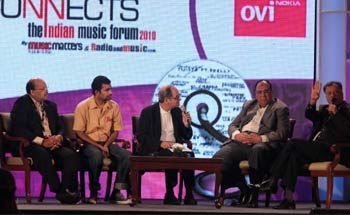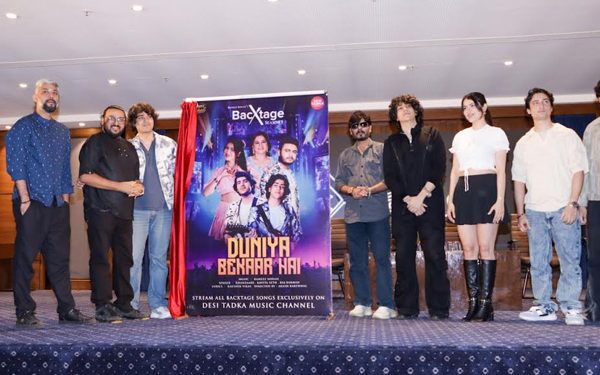MUMBAI: The stage was all set for day two of Hong Kong-based â€?Branded’ and Radioandmusic.com’s Nokia Music Connects which discusses major grim issues that are rattling the music industry today.
After a short opening speech by Ismaili music composer Suleiman Merchant of the Salim-Suleiman duo, the first session of the day was â€?The Piracy Puzzle’.
In today’s modern world where we have technologically moved on from radio and television to internet, mobile phones, Bluetooth and USB sticks, there is hardly anyone who buys an original CD or a DVD. In case you belong to the minority who does, you might be soon considered â€?Odd’.
With the rapid spread of digital platforms, music continues to be consumed like never before but almost all music which is downloaded today is illegal Even though the Indian government as well as the industry is making several efforts to counter this intellectual property theft, the lack of proper patent laws allow the perpetrators of this crime to get away scott-free. Rampant piracy is leading to government being deprived of tax revenues, jobs being lost and zero research and innovation. Will piracy spell the doom for the Indian music industry?
Panelists will probably be in a better position to come up with some answers. Those who had come together to discuss piracy were Moser Baer Entertainment Ltd’s Harish Dayani, EMI Pakistan Ltd’s Umer Sheikh, Indian Government’s key advisor to Copyright Vijay Lazarus from IMI and Only Much Louder (OML) founder Vijay Nair.
The moderator of the session was London-based Mobilium International CEO Ralph Simon who was extremely sporty and fun-loving throughout.
Music industry is worried about the fact that ongoing piracy is leading to music creators and labels being compensated for only a small part of what is consumed. Hence the industry is facing a challenge of monetizing music piracy so that revenues can flow towards the legitimate sector and in the process to the artistes who create music.
Everyone is involved in piracy and the genesis of the crime are the stakeholders which includes artistes, musicians, music companies and all the industry people,… said Dayani.
He further stated a shocking fact that people in India buy more motorcycles and cars in a year than legitimate CDs and DVDs. This clearly indicated that people do have money and they are ready to spend the necessary amount, hence money is not an issue.
Piracy is a function of value systems and is a culmination of many things. We need a Piracy Law to keep a check and even minor violation of the law should be subject to punishment. And for this, we need to prepare a time bound agenda failing which the industry will see all the money disappearing gradually,… added Dayal who also revealed that under 20 million people buy original DVDs and CDs and over 600 million people listen to pirated music.
The above statistics clearly indicate the dip in the retail sales. Moser Baer earned a revenue of 200 million from the sale of Kaho Na Pyaar Hai music which should multiply further in today’s age taking in consideration the inflation. But the case is just the opposite
There is absolutely no way to fight piracy as pirated CDs and DVDs cost much less. Why will people want to pay more? Pirates take the work of an artiste to make it available to the audience for cheap,… said Lazarus.
Vijay Nair who manages many talented bands has a completely different viewpoint to the current scenario. He pointed out that earlier live performances were done only to give a thrust to CD sales. He has turned that model on its head and for his artistes live performances are the major bread and butter, and if they have to give away music free to increase their dates, they will. For independent artistes, piracy leads to recognition.
When music is given for free, more number of people listen to it leading to increasing popularity of the artiste further leading to greater demand for his songs. Hence he ends up doing more number of concerts. Easy accessibility is something that works,… said Nair happily.
To this Lazarus added, Gone are the days when concerts sold CDs. Today CDs sells concerts. In case someone wants to really work on the issue of piracy, one needs to bring in a new value system. There is no other way to save the collapsing industry….
Ralph interrupted by raising an important question, â€?Is technological development the real beast?’
Technology is neither the problem nor the solution. We need to follow the older pattern and bring about a change in the ecosystem. Technology shouldn’t get more prominence over content. Unless a balance strikes between the two, the dilemma will continue. Technology without content is nothing and hence it should learn to respect copyright as well as content,… answered Lazarus.
Both accessibility and consumption of products and services leads to piracy. If a product or a service is only accessible and not consumed, the problem can be dealt with. If you keep the water tap open, people will surely take water for free but if you keep a check, they will have to pay for it. The case is just similar in case of music,… said Dayani.
Umer Sheikh ended on a positive note saying, The music industry needs to plan 25-28 per cent of real growth or the industry will not be able to sustain for long. If the issue of piracy is tackled successfully, there will be a stop to further piracy and the future of the Indian music industry will be safe….













